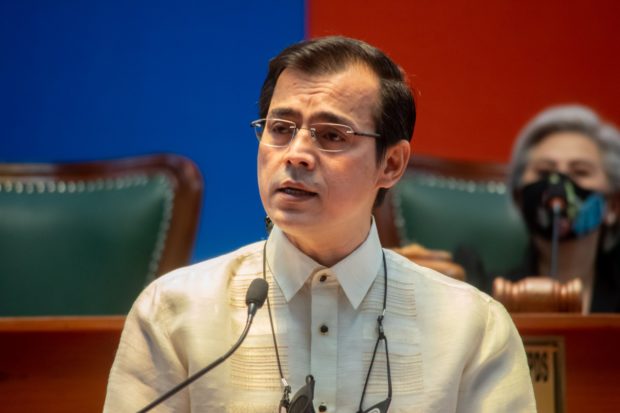
(FILE PHOTO) Manila Mayor Isko Moreno speaking on his third state of the city address. Courtesy of Manila PIO
MANILA, Philippines — The city government of Manila on Thursday clarified that it was Mayor Isko Moreno’s government that ordered an audit of a supply contract with dialysis service provider B. Braun Avitum Philippines, Inc. (BBAPI) for possible irregularities.
Moreno’s chief of staff Cesar Chavez said the city government has not paid BBAPI’s claims for dialysis supplies amounting to P53.8 million as it could not show the basis for the payment requests.
Earlier, COA said that the joint venture agreement entered by Manila’s past administration has been disadvantageous to the city for a myriad reasons, including a 20 percent discount given to patients which the city is shouldering.
“Simula nang umupo si Mayor Isko, hindi nagbayad ang Manila LGU sa hemodialysis supplies (consumables) worth P53.8M na sinisingil ng BBAPI. They cannot show the basis of the claim. Kaya naka-hold ito,” Chavez told reporters in a message.
(Since Mayor Isko got elected into office, Manila’s local government unit (LGU) has stopped paying for the hemodialysis supplies that BBAPI is claiming, worth P53.8 million. They cannot show the basis of the claim, that’s why it is out on hold.)
“Manila LGU under Mayor Isko is not enforcing it. It was the Manila LGU, under Mayor Isko, that requested COA to conduct special audit/review on that. ‘Yan ang lumabas, disadvantageous nga (And that is what came out, it was disadvantageous),” he added.
According to COA’s audit report of the city for 2020, it reviewed the joint venture agreement (JVA) to check whether the 15-year deal that Manila’s past administration inked with BBAPI was in accordance with existing laws.
BBAPI was tapped to build, manage, and operate a new dialysis center at the Gat Andres Bonifacio Memorial Medical Center (GABMMC) by the past administration. However, COA said that there are provisions that are unclear and may be disadvantageous to the city government.
In one case, COA said that the agreement that GABMMC would offer a 20 percent discount to patients under BBAPI’s program is problematic as the district hospital is a service-oriented institution, and not one that looks for profit.
But the bigger problem that COA found was that BBAPI does not have a mechanism that allows the discount to be passed on to patients, which means that only BBAPI is benefitting from the discounts as the city government still shoulders 100 percent of the fees.
Similarly, Chavez said that the local government did not enforce the 75-25 sharing scheme, where the city would have to shoulder 75 percent of the dialysis fees and the BBAPI with only 25 percent.
Instead, they were pushing for a 60-40 sharing agreement, which would be lighter on the city government’s expenses.
“Per Joint Venture Agreement with the past Administration, it’s 75-25 in favor of the BBAPI. The City Legal Office is proposing a 60-40 sharing scheme. We believe this is doable and advantageous to the government,” Chavez explained.
Chavez also assured the public that Manila has already heeded COA’s advice that the hemodialysis supplies should be procured by the city and not BBAPI.
“The city took over the procurement of hemodialysis supplies and stopped the payment for all supplies billed by BBAPI as per the JVA,” he said.
“The Mayor also instructed the City Legal Office to look into the provisions of the contact to increase the City’s share in the revenue of the JV commensurate to its investment and made it clear that if BBAPI is not amenable to the changes as per COA’s recommendation, CLO shall initiate the immediate termination of the contract,” he added.